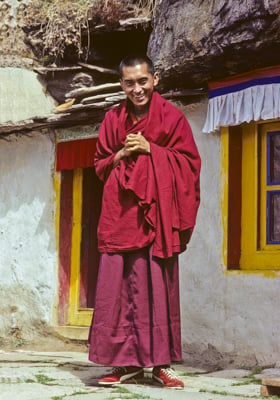Student's email
I am a Sherpa daughter. I have heard so many good things about you from my father. My family suggested I should search for you on the internet and I found you. I am seventeen years old and I'm in my first year of college, studying. Whenever I ask my father to tell me stories about you, he just gives a sweet smile and starts his story of his home and my great-grandmother and you. His smile is the same as yours. I would be honored if you would reply to my email.
Rinpoche's Response
My dear one,
Thank you very much for your kind letter. Yes, I am still alive, as your father said. What is his name and is he from Namche?
I am very happy that you are young because this means you have an incredible opportunity to make your life useful. There are many types of beings like you who want happiness and don't want suffering. Numberless of them are in bad states and so many humans don't even go for refuge to Buddha, Dharma and Sangha.
Because your family is Buddhist, they go for refuge to Buddha, Dharma and Sangha, so you are incredibly lucky. As a Buddhist you have an unbelievable opportunity by taking refuge and protecting your karma—renouncing negative karma, the cause of suffering, as much as possible, and creating good karma, the cause of happiness.
The essence is to renounce the ten nonvirtuous actions, which are the cause of unbelievable suffering and to practice the ten virtuous actions, the cause of very good karma for so many good lives in the future.
Not only that, discovering how samsara is in the nature of suffering, and looking for ultimate happiness, freedom from samsara. To achieve that we must practice the basic path, the three higher trainings—the higher training of morality, concentration and wisdom.
On the basis of that motivation, we develop compassion. We use our own samsara to see how unbearable the suffering is and to see how all beings have suffering, and with that we develop bodhicitta (Tib: jang chub sem). With that we follow the Mahayana path, we cease the gross and subtle defilements and we achieve the complete realizations. Then there’s nothing more to gain.
At that time we achieve the state of a buddha (Tib: sang gye). That is the peerless happiness and is achieved for sentient beings. Then we free the numberless sentient beings from the ocean of samsaric suffering and bring them all, who are numberless, to peerless enlightenment. Becoming a buddha is the ultimate purpose of our life, in order to free all living beings from suffering and bring them to ultimate happiness.
[We must understand] first, the purpose of life, and second, the Hinayana section of Buddhism. On the basis of that teaching, Mahayana Buddhism is practiced—practicing bodhicitta and achieving full enlightenment in order to bring all sentient beings to that enlightenment. On that basis, we bring all sentient beings to enlightenment, but that takes a long time. It takes three countless great eons to achieve that [by following the sutra path]. So we have incredible great compassion for sentient beings and the suffering they experience.
If we practice Mahayana tantra, we are able to complete the merit and wisdom in one life. There are four classes of Buddhist tantra. The lowest tantra [gives us] great skills to achieve enlightenment in this life, but it involves practices to make our life very long and it takes many hundreds of years [to achieve enlightenment] practicing lower tantra. Now we have greater compassion and we can't bear the suffering of others, so if we practice the fourth class of tantra, Highest Yoga Tantra, we can achieve the state of buddhahood in one lifetime, like Milarepa and other great yogis.
So the essence is that on the basis of Mahayana Buddhism, Mahayana tantra is practiced. All three levels in Buddhism are for the practice of lamrim, which is the basis. This is what you have to learn. Lama Tsongkhapa wrote a few different versions. You are young, so you have much opportunity to learn Dharma and benefit so many sentient beings and bring them to enlightenment.
In the meantime, live your life with a good heart, not just helping your family but all living beings. Working just for ourselves doesn't bring happiness for others and doesn't even bring us happiness. The selfish thought is an obstacle. When we study Dharma, the best thing is to live our life for others. It's the way to bring the best happiness to others and to us and makes our life beneficial.
I am very happy you contacted me. I can send you my books to learn if you like and we can meet sometime. If you have questions I can answer, it can take a little time. Please pass my best wishes to your family.
With much love and prayers ...































